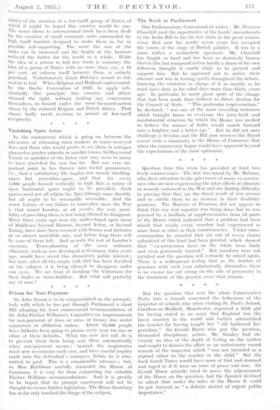Vanishing Open Areas In the controversy which is going on
between the advocates of rehousing town workers in many-storeyed fiats and those who would prefer to see them in cottages planned as garden suburbs or satellitetowns, Sir Raymond Unwin as upholder of the latter view may seem to many to have stretched his ease too far. But one very im- portant point he has thrown into useful prominence, viz., that a' satisfactory life implies not merely dwelling- space but recreation-space; and that for every 1,000 people housed vertically in high flats a ration of open horizontal space ought to be provided. Such spaces need not all adjoin the flats (though some should), but all .ought to be reasonably accessible. And the worst feature of our failure to town-plan since the War is that round London, at all events, the very possi- bility of providing them is fast being allowed to disappear. What three years ago were the undeveloped open areas of Middlesex beyond'Harrow, beyond Acton, or beyond Ealing, have since been covered with houses and factories alt an almost incredible rate, and before long there will be none of them left. And so with the rest of London's. environs. Town-planning of the most ordinary efficiency, such as was developed in Germany forty years ago, would have saved this elementary public interest ; but here, after all the empty talk that has been lavished on the subject, it is being allowed to disappear under our eyes. We are fond of deriding the Victorians for their faults as town-builders. But what' will posterity say of ours ? . * *






































 Previous page
Previous page